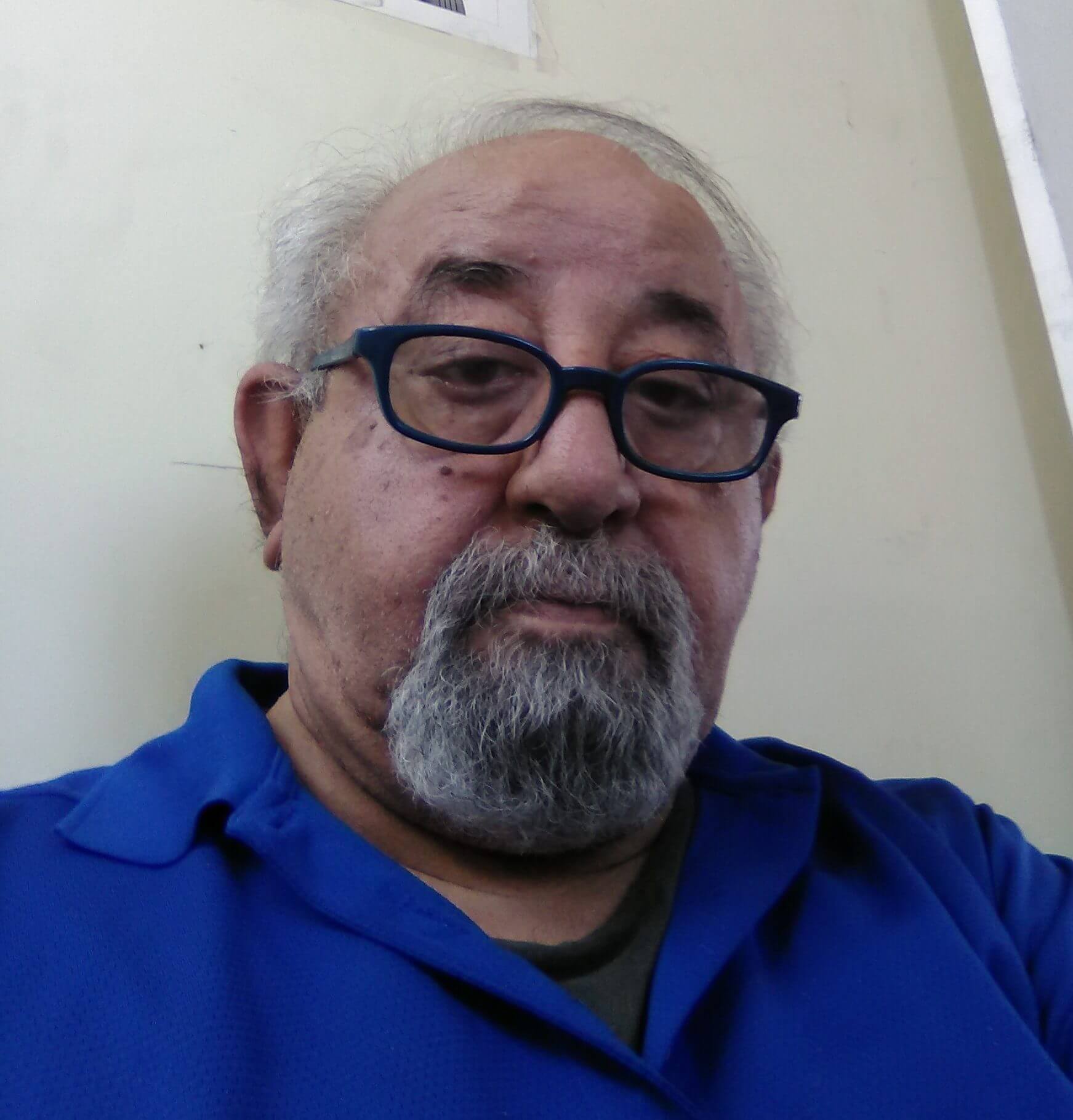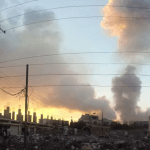Summary: Two separate articles, by Javier Sethness and Ali Kiani, respond to a critique of our support for the Syrian Kurds by Fredo Corvo, “Is the Defense of Afrin Proletarian Internationalism?” The response by Sethness and an earlier version of the one by Kiani first appeared in Coalition for Peace Revolution, and Social Justice — Editors
Internationalists for Afrin and Ghouta — by Javier Sethness
Response to Fredo Corvo, “Is the defense of Afrin proletarian internationalism?” (Libcom, 5 March 2018)
As a response to “Afrin Under Attack by Neo-Ottoman Erdogan: We Must Defend Afrin,” a statement published on the website of the Coalition for Peace, Revolution, and Social Justice on January 22, Fredo Corvo’s posing of the question, “Is the defense of Afrin proletarian internationalism?” (Libcom, 5 March), unfortunately presents several arguments based on straw-men. Though he ostensibly writes from a libertarian-communist perspective, he dedicates much effort to critiquing Marxist humanism, thus overlooking the fact that our Coalition represents a convergence of different revolutionary-left groupings and individuals. Plus, Corvo’s critique is only vaguely anti-capitalist, far from being concretely humanist or anti-imperialist. It is unclear whether Corvo’s critique can be considered anarchist.
Citing Rosa Luxemburg, Corvo argues that small nations such as the Syrian Kurds inevitably serve as “the pawns on the imperialist chessboard of the great powers,” adding that calls for solidarity with those besieged in and displaced from Afrin by Turkish imperialism and its Arab proxies inevitably recall Stalinist calls to defend the Soviet motherland and suffocate any consideration of an alternative to what exists. That is to say, Corvo holds our statement in solidarity with Afrin to by necessity be supportive of the Kurdish Democratic Union Party (PYD), or the hegemonic proto-State of Rojava/Democratic Federation of Northern Syria (DFNS) since 2012, and U.S. imperialism, with which the PYD and its armed forces, the YPG/YPJ and SDF, are allied. He accuses our position of advancing the “myth of Rojava” and of being “left bourgeois.”
Yet these insinuations and charges are untenable. It is unfortunate indeed that Corvo uses Luxemburg in an anti-humanistic manner, minimizing the destruction wrought by Turkey and its proxies in Afrin in the past two months and rendering-invisible the suffering of besieged working masses, internally displaced peoples, and refugees in and around Afrin. It is this principle of the defense of oppressed peoples, which Corvo acknowledges as being “undisputed within the workers’ movement,” to which we appeal in our statement in solidarity with the peoples of Afrin. It is not necessarily to endorse any project of national liberation that may be favored by Syrian Kurds and other oppressed minorities of Syria, though we do stress the importance of self-determination for oppressed peoples. In addition, it is certainly untrue that our Coalition presents an uncritical view of the Rojava Revolution, as in the idea of the “Rojava myth” to which Corvo alludes: even the statement on Afrin itself mentions the Revolution’s “contradictions, as seen in these very ties between the Kurds and U.S. and Russian imperialists.” We concede many of the criticisms Corvo raises against the Revolution, particularly with regard to relations between the PYD and the Assad Regime. For example, the Kurdish-majority forces of the YPG/YPJ appear to have collaborated with Russia and the regime in their reconquest of Eastern Aleppo during fall 2016, and it is known that the Syrian Democratic Forces (SDF) arranged to transfer territory taken from Daesh (ISIL/ISIS) west of Manbij to Assad regime control in March 2017 to provide a buffer zone between itself and the Turkish-supported Free Syrian Army presence in Jarablus. Moreover, pro-regime militias arrived in Afrin on February 20, 2018, to reinforce the defense of the city, and Assad has allowed transfer of SDF troops and matériel to pass through State-controlled territory en route to Afrin. Furthermore, we are aware that the Rojava constitution of 2014 recognizes private property as a “right” (article 41). Yet these realities are not ones that are readily acknowledged by uncritically supportive Rojava-solidarity activists and organizers in the U.S., such as the North American Kurdish Alliance (NAKA). As a Coalition, we did not support NAKA’s calls for a no-fly zone over Afrin and MANPAD’s to be transferred to the YPG/YPJ as part of the demands set forth for the worldwide day of mobilizations for Afrin on March 24. Had we done so, and had we been reluctant to acknowledge some of the Revolution’s limitations, Corvo’s critique might be more apt.
We acknowledge that the Syrian Revolution which began in March 2011 was a necessary precondition for the Rojava Revolution of July 2012, and we seek to build solidarity for both ongoing processes, which are greatly threatened by the despotic forces of Assad and Putin as well as Erdoğan, respectively. We disagree that our statement in solidarity with besieged and displaced workers and peasants in Afrin equates to or implies an uncritical “defense of Rojava” on our part, and we reject the idea that such a statement aligns us with neo-Stalinism or imperialism against the working classes. We do not see our call for solidarity with Afrin as different from our support for the besieged population of Eastern Ghouta, who now must await capture by the very forces that have been bombarding them for nearly five years now, cross perilously into regime-controlled territory, or accept forcible transfer to the Idlib province, which will be the next major target of the militaristic imperialism of the Assad Regime, Russia, and Iran. Support for oppressed peoples means criticizing and organizing against those forces oppressing them; it does not mean uncritical support for those who claim to defend them by force of arms.
Ironically, then, we agree in the abstract with Corvo’s conclusion that an end to the various wars and genocides now gripping the Middle East will not come until the region’s working classes “attai[n] the same level as in Iran at the turn of the year,” with a few qualifications. First, this task is not only that of the Kurdish workers, as Corvo implies, but of all workers in the region—and not only the region, but also the world, given the global nature of imperialism. Second, both the Syrian and Rojava Revolutions have demonstrated impressive initiatives in terms of self-organization and class struggle that in fact may have anticipated and in some ways inspired the recent Iranian uprising, just as popular regional Palestine-solidarity movements and protests in Egypt against the U.S. invasion of Iraq served as precedents for the Arab Revolts which began with Mohammed Bouazizi immolating himself in Sidi Bouzid, Tunisia, in late 2011, emanating echoes that would resonate in Syria, as elsewhere, among Kurds and Arabs alike. So yes, in sum, the defense of Afrin and Ghouta against aggression is internationalist and humanist.
Javier Sethness is a member of the Black Rose/Rosa Negra Anarchist Federation
In Defense of Freedom and Humanity in Afrin! — by Ali Kiani
Over the past decade and in the midst of the civil war in Syria, the Kurdish people of Rojava and Afrin have surprised the world with their struggle for freedom by creating a democratic model of self-government that has empowered women into top leadership positions in every aspect of society, including the Peshmerga militia. The Kurds have done so to a greater degree than all the authoritarian and reactionary regimes of the Middle East. Women holding key positions in self-government and army, reflecting the belief that women’s rights should be at the center of every important decision-making process in society, an important breakthrough in the struggle of the people of the Middle East for freedom and democracy.
Not only jihadists, but also all ideological and religious authoritarian regimes are united to destroy this liberation phenomenon that is growing in the Middle East, as we have also seen in the example of a Yazidi women’s liberation militia that was formed in the Kurdish model.
Now Turkey’s Erdogan, with the help Iran, Syria, and Russia — and with the blessing of Trump — are trying to do what jihadists could not succeed in doing. As soon as the brutal bombing and invasion of Afrin started, its brave people started defending their humanity against one of the largest armies of the Middle East, and this without air support. The destruction of city was unattainable at first. At the head of Erdogan’s forces are Arab proxies, most of whom are Islamists. With their capture of the city of Afrin, the humanitarian situation is going to become much worse. As Afrin filled refugees with no place to go, each day Turkish jets, which are provided by the Americans, bombarded the city. Turkey’s tanks, supplied by the German government, will soon appear on the hills around the city, while the world remains silent on this atrocity.
Meanwhile, the devastation and tragedy continue in Eastern Ghouta, as Assad’s forces besiege the Syrian opposition.
Even the declaration of a cease-fire and no-fly zone did not stop Erdogan bombing defenseless people in Afrin. We know that the Turkish people do not believe the lies of the regime of Erdogan, and that people who want peace do not support the campaign of mass murder, rape, and ethnic cleansing that Erdogan has set about implementing, and which Turkish journalists have exposed.
As these events were unfolding, I saw “A critique of two article published by the International Marxist Humanist Organization by Fredo Corvo.” Corvo sarcastically chooses a title that denies the defenders’ link to Marxism —“Is the defense of Afrin proletarian internationalism?” He does not clarify his ideological approach, whether as Marxist or non-Marxist, leading us to question the motive for his writing this article. Is it anti-Marxist (which he is), or is it anti-anarchist (which he also is)…? Or does he write in defense of Erdogan, Assad, or the Islamic Government of Iran?
In the first paragraph which should be considered introductory, FC (Fredo Corvo) explains the event: “The Turkish invasion of Northern Syria, with the declared goal of expelling the Kurdish YPG from the Turkish border.” This he comments on as being a reactionary imperialistic move to keep Erdogan in power, but he does not clarify his position on the Kurds’ right of self-determination. Instead, he focuses his critique on left radicalism (Marxist and anarchist), in particular Marxism, with its longstanding pattern of defending the Kurds and condemning the invasion by Turkey. This should be nothing new, except that FC writes, “in this case we see that groups and individuals who orient themselves at the Communist Left (1) are influenced by left bourgeois positions. Even groups whose ancestors defended proletarian internationalism in the Second World War now find it difficult to put forward the workers’ struggle against imperialist war. As we shall see, this has partly to do with a microscopic view of Rojava, the microcosm of a supposed ‘socialism in one province’.”
First of all, I have to say that what he refers to as our ancestors is not the Marx that Marxist-Humanists link to, but a Stalinism that was dominated by a most post-Marx “Marxism” during and after the Second World War. In fact, no tendency within Marxist-Humanist organizations nor any of its founders ever believed in socialism in one country. And since I prepared this speech for a rally against the war which was later published as an article, the critique is now addressed towards me and my understanding of Marxist-Humanism. My support of Kurdish self-determination came about before I knew a philosophy of Marxist-Humanism even existed within the Iranian Revolution, when I rejected Maoism, Stalinism, and “socialism in one country” and even Lenin’s theorizing in the period before his break with his philosophical past after studying Hegel in1914-15. My own understanding developed in the period between the beginning of the Iranian Revolution and before the takeover by the Islamic movement. I consider Khomeini to be a reactionary based on my own personal experiences and his book Islamic Government. This led me to wonder: How exactly was I influenced by “left-wing bourgeois positions”?
Then FC issues a sharp attack on the International Marxist-Humanist Organization (IMHO) and Rojava based on two articles that were published on IMHO’s site. He calls Rojava a myth. FC then continues with defining Marxist-Humanism and anarchism. He writes, “I will not reiterate my criticism of these principles of Marxism-Humanism. (7) Instead, we move from the Rojava myth to some classic justifications of involvement in the imperialist war, which can also be found in the ‘defense of Afrin’ by some Marxist-Humanists.” He does not explain how the “Rojava myth” means the “classic justifications of involvement in imperialist war.”
First, FC attacks Marxist Humanists; second, he attacks Marx on the national question; third, he pits Lenin against Luxemburg in an attempt to to dismiss Lenin; fourth, he opposes Trotsky to Stalin to try to dismiss Trotskyism; fifth, through a lengthy story of Marxism from World Wars I and II he tries dismiss any support for people’s struggle against imperialism and l the PKK against Rojava based on abstract proletarianism—all because I wrote: “(…) the least we can do is to offer solidarity with the progressive, multi-ethnic people of northern Syria for the future possibility of a democratic alternative in the Middle East based on justice and freedom, something that could evolve into an anti-capitalist humanist alternative. The Kurdish people of Afrin can depend only on International solidarity and the comradeship of progressive forces who stand for an anti-capitalist alternative.”
FC has an abstract understanding of Marxism or class struggle, if he believes that in the age of imperialism and the globalization of capital and its financialization, the struggle of the Kurdish people in the Middle East—a place dominated by reactionary forces, being a warzone in a mostly rural area fighting for self-determination—is not defensible from a proletarian point of view just because their objective survival situation forces them to coexist with one imperialist against the other to resist the most immediate threat from reactionary forces. FC’s position is not defensible for the purposes of solidarity. If FC had any experience organizing people for survival and armed struggle — against the most brutal dictators, despotic religious fanatics, the effects of war or its physically and psychologically tormenting effects — he would think twice about analyzing things as being so black and white. If FC had any experience of being among the people of Rojava or other Kurdish populations, or if he had first-hand information about people that are there, and if he would observe the machinations of reactionary forces, including the US and Russia, he would not be able to judge them so negatively or to deny them simple human solidarity. That said I should note that neither I nor my Marxist-Humanist organization has ever supported these organizations or their policies unconditionally.
The dialectic of revolution is not just in thought but also objective, as it was for Lenin, especially his understanding of imperialism, which was a deeply dialectical concept. As my comrade Kevin B. Anderson wrote recently:
‘For just as imperialism transformed the nature of capitalist domination, helping to create a new stage based on finance capital, monopoly capitalism also changed the character of the opposition to capitalism. Imperialism not only impacted the working classes inside the industrialized capitalist societies. It also set in motion a whole series of events outside the core capitalist powers of Europe and North America, events that brought into being one of the great revolutionary forces of the whole twentieth century, anti-imperialist national movements, from Ireland to India and from China to the Middle East, Africa, and Latin America. As Lenin saw it then, while imperialism immensely strengthened capitalism, at the same time, in dialectical fashion, it created these new contradictions that opened up revolutionary possibilities.
Lenin noted not only the oppression of people of the Global South under colonialism, but he also wrote presciently as early as 1916 of their subjectivity, their agency: “The dialectics of history are such that small nations, powerless as an independent factor in the struggle against imperialism, play a part as one of the ferments, one of the bacilli, which help the real anti-imperialist force, the socialist proletariat, to make its appearance on the scene” (LCW 22, p. 357) Unlike the complacent reform socialists of his day, who condescended to colonial subjects and who purported to see positive as well as negative sides to imperialism, Lenin is unequivocal in his opposition to imperialism and his support for anticolonial liberation movements […]. However, he added two caveats: (1) That the colonized cannot liberate themselves completely on a national basis, that as cited above, in order to do so they will need to ally with forces inside the industrialized imperialist nations, ‘the socialist proletariat.’ Thus, they might even win independence, but will not be able to create in full a new humanist society by themselves in a technologically underdeveloped nation. (2) That the national liberation movement needs to be actually liberatory in its content, not necessarily fully anticapitalist, but at least not retrogressive and backward looking. In this regard, he singles out “Pan-Islamism” as a non-liberatory form of opposition to imperialism in his 1920 “Draft Theses on the National and Colonial Questions” […].. On this score, Lenin met vociferous opposition from fellow revolutionary Marxists. Even Trotsky took a while to agree to Lenin’s position, while Luxemburg and Bukharin, both of them important revolutionary Marxist theorists, argued against Lenin’s position, claiming that in the era of imperialism, all nationalism is reactionary. Some today would say that Lenin’s position is either invalid or outdated, and that one just has to look at the outcome of anticolonial movements once they come to power. Look, they say, at Jacob Zuma or Robert Mugabe or Nicolas Maduro. But that’s like saying that the labor movement is invalid or outdated because once unions gained some power, their successful labor bureaucracy channeled the workers away from revolution and toward integration with capital.’
Thus, it is not because the limitations and setbacks of national movements in the age of state capitalism obviates the need for solidarity from leftist and working classes toward these movements, but it is because of their potential, as seen in their most revolutionary aspects, to add an important aspect to the anti-capitalist struggle. Their struggle for freedom, democracy, and political autonomy in a national federation contains important revolutionary potential, so long as they believe in a Humanist alternative to capitalism, based on the self-emancipatory revolutionary principles emanating from a people organized from below. In fact, I think — and this my personal idea — that any form of centralized state opposing the decentralization of power is contradictory to communism. I also think that the same is true in terms of conceptualizing a transformation toward a new humanist society. This would hold even for a transitional period that would not yet allow for the dissolution of either the state or class, as Engels claims.
Ali Kiani is a member of the International Marxist-Humanist Organization







0 Comments